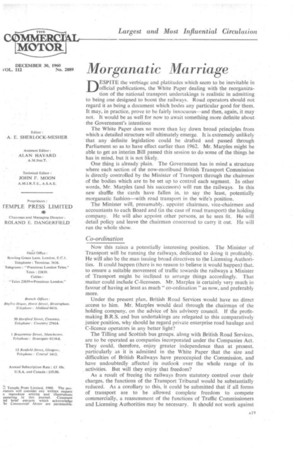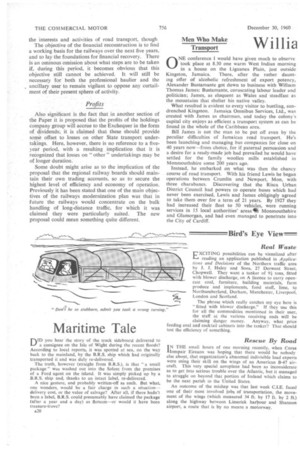Morganatic Marriage
Page 21

Page 22

If you've noticed an error in this article please click here to report it so we can fix it.
DESPITE the verbiage and platitudes which seem to be inevitable in official publications, the White Paper dealing with the reorganization of the national transport undertakings is realistic in admitting to being one designed to boost the railways. Road operators should not regard it as being a document which bodes any particular good for them. It may, in practice, prove to be fairly innocuous—and then, again, it may not. It would be as well for now to await something more definite about the Government's intentions The White Paper does no more than lay down broad principles from which a detailed structure will ultimately emerge. It is extremely unlikely that any definite legislation could be drafted and passed through Parliament so as to have effect earlier than 1962. Mr. Marples might be able to get an interim Bill passed this session to do some of the things he has in mind, but it is not likely.
One thing is already plain. The Government has in mind a structure where each section of the now-moribund British Transport Commission is directly controlled by the Minister of Transport through the chairmen of the bodies which are to be set up to control each segment. In other. words, Mr. Marples (and his successors) will run the railways. In this new shuffle the cards have fallen in, to say the least, potentially morganatic fashion—with road transport in the wife's position.
The Minister will, presumably, appoint chairmen, vice-chairmen and accountants to each Board and (in the case of road transport) the holding company. He will also appoint other persons, as he sees fit. He will detail policy and leave the chairman concerned to carry it out. He will run the whole show.
Co-ordination
Now this raises a potentially interesting position. The Minister of Transport will be running the railways, dedicated to doing it profitably. He will also be the man issuing broad directives to the Licensing Authorities. It could happen (there is no reason to believe it would happen) that, to ensure a suitable movement of traffic towards the railways a Minister of Transport might be inclined to arrange things accordingly. That matter could include C-licensees. Mr. Marples is certainly very much in favour of having at least as much "co-ordination "as now, and preferably more.
Under the present plan, British Road Services would have no direct access to him. Mr. Marples would deal through the chairman of the holding company, on the advice of his advisory council. If the profitmaking B.R.S. and bus undertakings are relegated to this comparatively junior position, why should he regard private enterprise road haulage and C-licence operators in any better light?
The Tilling and Scottish bus groups, along with British Road Services, are to be operated as companies incorporated under the Companies Act. They could, therefore, enjoy greater independence than at present, particularly as it is admitted in the White Paper that the size and difficulties of British Railways have preoccupied the Commission, and have undoubtedly affected its outlook over the whole range of its activities. But will they enjoy that freedom?
As a result of freeing the railways from statutory control over their charges, the functions of the Transport Tribunal would be substantially reduced. As a corollary to this, it could be submitted that if all forms of transport are to be allowed complete freedom to compete commercially, a reassessment of the functions of Traffic Commissioners and Licensing Authorities may be necessary. It should not work against the interests and activities of road transport, though.
The objective of the financial reconstruction is to find a working basis for the railways over the next five years, and to lay the foundations for financial recovery. There is an ominous omission about what steps are to be taken if, during this period, it becomes obvious that this objective still cannot be achieved. It will still be necessary for both the professional haulier and the ancillary user to remain vigilant to oppose any curtailment of their present sphere of activity.
Profits
Also significant is the fact that in another section of the Paper it is proposed that the profits of the holdings company group will accrue to the Exchequer in the form of dividends; it is claimed that these should provide some offset to losses on other State transport undertakings. Here, however, there is no reference to a fiveyear period, with a resulting implication that it is recognized that losses on " other " undertakings may be of longer duration.
Some doubt might arise as to the implication of the proposal that the regional railway boards should maintain their own trading accounts, so as to secure the highest level of efficiency and economy of operation. Previously it has been stated that one of the main objectives of the railways modernization plan was that in future the railways would concentrate on the bulk handling of long-distance traffic, for which it was claimed they were particularly suited. The new proposal could mean something quite different.




























































































